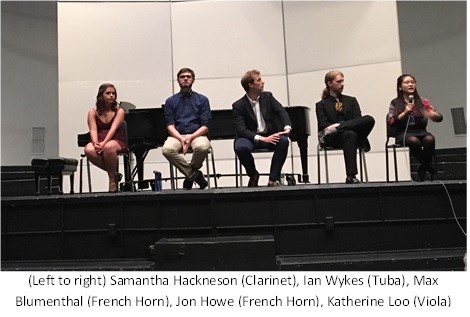On Thursday October 12, 2017, the University of Rhode Island’s music department continued its convocation series with its sixth event of the semester. Generally, the convocations consist of faculty, students or special guests with discussions. This time however, there was show-case of URI’s instrumental students playing individual pieces for an audience of their peers.
The program started off with violist, Katherine Loo, who played “Theme and Variations” by Carl von Weber. She was accompanied by faculty member Cheryl Casola. Following this were two more instrumentalists, accompanied by faculty member Gayane Darakyan on the piano. Two of these three performers both played French horn and played from the same piece, “Horn Concerto No.1, op.11” by Richard Strauss. Jon Howe played the part of Allegro, while Max Blumenthal played the part of Andante.
What was very intriguing and uncommon from the other performances was that of Ian Wykes, who played tuba without accompaniment. A bold move, that allowed him to have more freedom with his performance. According to Wykes, it was a little daunting to have such freedom, but it went along with the philosophy of “not letting the instrument control you”. Wykes played “Sonata Breve (I-IV)” by Jack Gallagher. The last performance was that of Samantha Hackneson, on clarinet, who played “Fantasiestucke” by Robert Shumann, accompanied again by Daraykan on the piano.
It was evident that each student who performed put a consistent amount of time and effort into their pieces. The expression felt from each performance was enough to give anyone goosebumps. There is no doubt that the music program is full of remarkable students who know the meaning of hard work.
The convocation continued with a discussion following the performances. The performers sat on the stage and welcomed questions from their peers in regards to their practice and performance techniques. The Q&A session was facilitated by Joseph Parillo, a professor of music at URI and musician himself. The session was essentially student led, with helpful and guiding interjections from that of Parillo.
During the talk the main points discussed were mindset, panic, practice, and performance. The student performers discussed how talking backstage, shaking things off, practicing technically, and using resources such as recordings, enabled them to have successful performances. According to the performers, panic was prevalent in their mindsets. Nonetheless it was seemingly non-existent in their actual performances. Here, they discussed the reality of performing and the need to immerse themselves into their pieces and how it can be difficult, especially on a stage in front of their peers.
Likewise, there are a plethora of involuntary shakes, rapid heartbeats, and instrument malfunctions that could arise. The key word here is involuntary- out of one’s control, and in being aware of this, the performers are given solace that they did their absolute best. Even if you’re not a musician there’s a lot to take away from this convocation. There are many instances in daily life where you must have confidence in your abilities, and focus on the task at hand. You will face your colleagues, professors, bosses, and be expected to know what you’re doing. Without practice, there is no possibility of success. Absolute perfection is not attainable but knowing that you did the best you could and worked to the best of your ability is better than being perfect. Parillo said. “Yes, panic and performance do start with the same letter but don’t go together.” With separation of the two, beautiful things are possible.

